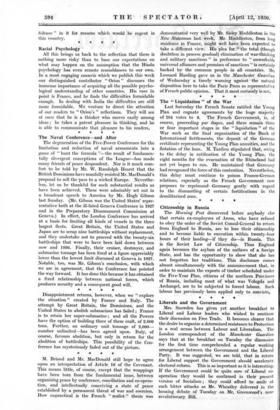The Naval Conference—and After The degeneration of the Five-Power Conference
for the limitation and reduction of naval armaments into a game of " hunt the formula "—the result of fundamenz tally divergent conceptions of the League—has made many friends of peace despondent. Nor is it much com- fort to be told by Mr. W. Randolph Hearst that the British Dominions have manfully resisted Mr. MacDonald'-s proposal to sell the pass to a wicked Europe. Neverthe- less, let us be thankful for such substantial results as have been achieved. These were admirably set out in a - broadcast speech to America by Mr. Hugh' Gibson last •Sunday. -(Mr. Gibson was the United States' repre- sentative both at the ill-fated Geneva Conference in 1927 and in the Preparatory Disarmament Commission at Geneva.) In effect, the London Conference has arrived at a basis for limiting all kinds of vessels in the three largest fleets. Great Britain, the United States and Japan are to scrap nine battleships without replacement, and they undertake not to proceed with the twenty-six battleships that were to have been laid down between now and 1986. Finally, their • cruiser, destroyer, and submarine tonnage has been fixed at a figure appreciably lower than the lowest limit discussed at Geneva in 1927. Notable, too, was Mr. Gibson's conclusion, with which we are in agreement, that the Conference has pointed the way forward. It has done this because it has obtained a fixed relationship between national forces, which produces security and a consequent good will.
* * * *


























































 Previous page
Previous page